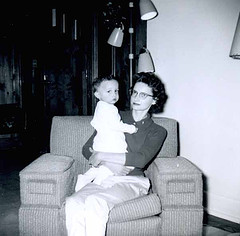Two portrayals of life stories that may seem unremarkable … but the charm and pull of these stories is truly in the eye of the beholder.
As a child of the 50s and 60s, I have long been fascinated by that era — from movies made during that time to what life was like for women of the period (a reason I adore the TV show “Mad Men.”) So, I was drawn to Carolyn’s Diary, being blogged by her son Bill. It’s debatable whether Carolyn’s Diary entries even tell a story, but through the cumulative journalings, the story of an American homemaker in the age of the Feminine Mystique emerges. Here’s how Bill describes the diary:
 My mother kept diaries from January 6 1962 until the morning she died in October 1998. Her diaries were written for practical purposes, and provide a chronicle of the events of her days. Few feelings are expressed, if any, and you have to read between the lines to discern her emotions. She would often refer back to her diaries to confirm that the roof was replaced on this date, the taxes were paid on that date, the weather was sunny and warm or snowy and windy. My mother stopped working when I was born in 1959, and my father was a US Navy diver. My mother’s first diary was presented to her on January 6, 1962, when her parents arrived from Iowa for an extended stay as my dad prepared to leave the country with the Navy. … It is simply a record of the day-to-day life of an average American housewife.
My mother kept diaries from January 6 1962 until the morning she died in October 1998. Her diaries were written for practical purposes, and provide a chronicle of the events of her days. Few feelings are expressed, if any, and you have to read between the lines to discern her emotions. She would often refer back to her diaries to confirm that the roof was replaced on this date, the taxes were paid on that date, the weather was sunny and warm or snowy and windy. My mother stopped working when I was born in 1959, and my father was a US Navy diver. My mother’s first diary was presented to her on January 6, 1962, when her parents arrived from Iowa for an extended stay as my dad prepared to leave the country with the Navy. … It is simply a record of the day-to-day life of an average American housewife.
The Most Mediocre Story Never Told is a one-man show that has been running recently in LA. A blog entry by Steven Leigh Morris explains the premise:
Jay Sefton wrote and performed in his one-man autobiographical show, “The Most Mediocre Story Never Told” … It’s the remarkable tale of an unremarkable young guy struggling to tell his life story in a one-man-show for reasons that he doesn’t fully understand. But perhaps by telling of his youth in Philadelphia, and his humiliating performance as Christ in a Catholic school production of the Passion Play, he will discover the reason that he’s on the stage recounting his adventures as a child actor, stooping in a ‘fairy robe’ to wash the feet of Christ’s disciples. … Sefton cuts to the heart of his tantalizing concept: ‘I looked up ‘story’ in the t
hesaurus, just to see if I had one, and most of the words had something to do with not telling the truth. Fable, yarn, gossip, rumor, legend. There are other words there too. Anecdote, chronicle, but there is a whole subsection called lie. As an actor we hear, ‘Just tell the story. What’s the story? I am just listening for the story. You are a storyteller. … Where are these stories? Where do they really exist? And who am I without them?’ Sefton asks in his show. … The broader question that Sefton doesn’t ask is, Who are we without stories?
Indeed. No matter how dull, mundane, trivial, and inconsequential our stories may seem, they make us who we are. They make us fascinating.
